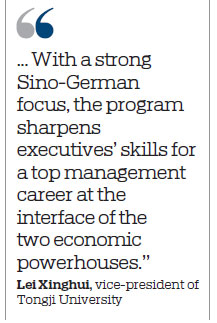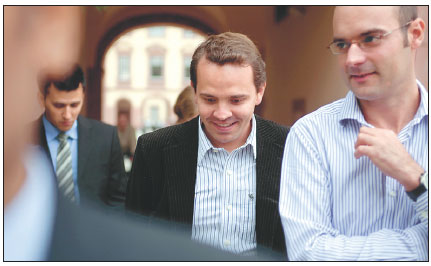Education program shines as a beacon of Sino-German success
The Sino-German executive management program at Shanghai-based Tongji University is striving to reach new heights in light of the fast-changing, dynamic business environment for which it is preparing tomorrow's leaders.
After nearly a decade's prolific development, the program is building on a strong foundation. Tongji-Mannheim's dual degree Executive MBA program was jointly established by Tongji University School of Economics and Management and the German Mannheim Business School in 2010. It is the first and only Sino-German EMBA program in China. Both institutions are renowned for their high academic quality, cutting-edge research and teaching standards.
Tongji University has close, longstanding ties to Germany, which can be dated back to its establishment in 1907. The program can be seen as the latest chapter in Tongji University's efforts to explore an international development path.

The program was established at a time when the two countries vowed to intensify their economic and trade relations and strengthen business connections. Therefore, it is a response to the growing demand of professionals and executives to navigate business challenges across cultures, said Lei Xinghui, vice-president of Tongji University.
"The program has been positioning itself at the pinnacle of the pyramid from the very beginning. With a strong Sino-German focus, the program sharpens executives' skills for a top management career at the interface of the two economic powerhouses," Lei said.
"It has not only become a Sino-German showcase project, but also gives the country an example and model for developing high-level business education under the context of globalization," said Shi Qian, vice-dean of the School of Economics and Management at Tongji University.
The Tongji-Mannheim EMBA program has a style of its own, such as a complete course design with emphasis on Sino-German perspectives; general management expertise from business domains; a heterogeneous student body and alumni group with multicultural perspectives; highly relevant to related areas of technology and manufacturing-based business; highly applicable to practices and highly flexible for participants, who are usually senior executives with busy schedules.
"The program provides a good ecosystem, not only from all professors but also classmates, giving me a chance to experience Germany's organized mindset and Chinese agile practice. Now, I can reach out (to achieve) a balance," said Dai Yuanshen, who works at the world's leading chemical company BASF.
"I am technical and have an operational background. After finishing all six modules, I recognized that I have learned a new 'language', which can support me to understand and talk to business partners and also the board members and president of our company," he said.
"After taking the courses of this program, I have been volunteered to take over the digital projects in my company. And then I was promoted to head of the Greater China digital team in my company. I have made a successful transition from factory management to digital project, broadening my career path," he said.
"The learning experience was truly enriching. Even though it was a Sino-German program, the professors were from universities from all over the world. This gave the program a truly global feel," said Dilip Radhakrishnan, who works at SAP Software Solutions.
"All the classmates were senior leaders in their respective organizations and were from a variety of industries. This meant that the classroom discussions were filled with very diverse comments and ideas. The group work sessions and after-class assignments were also very stimulating," he said.
"I learned a lot about the Chinese business environment and how the businesses there think and how they operate and how different it was from the German way of operating. But the most important takeaway has been the trust and friendship developed with the classmates and the network we can tap well into the future.
"The things I learned during the program, inside and outside the classroom, go a long way in helping me deal with the challenges of my new role. Since finishing my EMBA, I have relocated to Asia to lead our business unit in this region," he said.
Rosa Lee, executive vice-president of Bosch (China) Investment, said her organization needs to fill new roles at the executive level and "Tongji-Mannheim EMBA program is supporting our leaders to evolve themselves into a transformational leader.
"A successful business leader working in a future of VUCA (volatility, uncertainty, complexity and ambiguity) needs to be a 'global leader', meaning one possessing global thinking with local understanding," said Lee.
"The wisdom behind the close economic relations between China and Germany is 'win-win', which is becoming extremely important for any business to succeed in the digital world. Both Chinese and European companies need their executives to deeply understand the local culture, market and business model with broader overview."
The Tongji-Mannheim EMBA program makes up for many insufficiencies found in a traditional executive business education, said Dong Qi, who participated in the founding of the Tongji-Mannheim's EMBA program. He is now the director of the Sino-German Cultural Exchange Research Center at Tongji University.
"This is a two-way cooperation. Chinese participants learn more about business principles from around the world, and more importantly, foreign participants can gain an in-depth understanding of China," Dong said. "Chinese students and foreign students study together. The East and West collide and sparkle."
Dong noted that a growing number of German businesses have shown interest in the Chinese market as China's economy is growing stronger.
"This means an increasing demand for appropriate education to help these businesses to understand the local market, business culture and environment. The Tongji-Mannheim EMBA program will undoubtedly play an important role during this course," he said.
|
Tongji-Mannheim's dual degree Executive MBA program is set to serve the growing demand of professionals and executives to navigate business challenges. |
|
Students enrolled in the Tongji-Mannheim EMBA will study in both China and Germany. Photos provided to China Daily |
(China Daily 05/20/2019 page24)
















